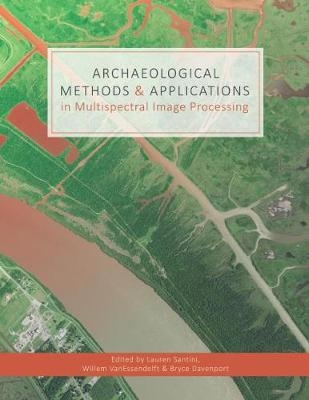
Archaeological Methods & Applications in Multispectral Image Processing
Oxbow Books (Verlag)
978-1-78570-732-2 (ISBN)
Remote sensing and geographic information systems (GIS) have become standard data modelling and research tools with a wide range of applications. Aiming to facilitate discussion about the development of discipline-wide standards for technical data processing, this volume surveys the development and state of the field and showcases studies employing remotely sensed data to investigate archaeological problems in a variety of geographic settings, including the American Southwest, Kenya, Yucatan, the Mississippi Gulf Coast and Southeastern Louisiana, and the Maya Lowlands. Papers highlight a series of methodological challenges across a diverse set of environmental regimes, using both tried-and-true and in-development solutions for archaeological prospection, environment characterization and heritage management. Contributors showcase innovative theoretical approaches and methods in data collection and analysis that contribute to new insights, which would have been inaccessible through traditional fieldwork alone. This volume presents a discussion of the state of the field as it stands now, and a critical assessment of developments necessary to its survival and is intended to serve as a training model.
Lauren M. Santini is a researcher at Harvard University. She is an archaeologist and remote sensing specialist. Her research focuses on environmental issues among the ancient Maya; specifically focused on multispectral satellite imagery, and ethnobotany with a focus on wood charcoal analysis. She has conducted fieldwork in Guatemala, Honduras, China, Turkey, and North America. Her current project focuses on tree and forest resource use in the Maya Mountains, Belize, with the Maya Mountains Geospatial Project. Willem VanEssendelft is an archaeology doctoral candidate at Tulane University, and a practising information technology consultant. Previously, his research has used remote sensing and GIS to assess Aztec imperial expansion narratives in their historical record. He is currently performing fieldwork on ancient hydrology in central Mexico and has also dug square holes in the northern Yucatan peninsula and Honduras. Bryce Davenport is an independent scholar based in Baltimore, Maryland. While completing his graduate studies at Brandeis University, he focused on Mesoamerican political economy and terrain modeling applications for understanding territoriality.
Forward
Lauren M. Santini, Willem VanEssendelft and Bryce Davenport
The Application of Remote Sensing and GIS Technology to Archaeological Research: Past, Present, and Future
Thomas L. Sever
Part I
Geospatial Data and Dialogue: Perspectives from an Interdisciplinary Project along Quintana Roo’s North Coast
Andrew Vaughn
Multispectral, Low Altitude Aerial Photography Methods for Archaeological Survey
Sarah Hlubik, Emily Wahler, Craig Feibel, J. W. K. Harris
Remote Sensing of Vegetation as a Proxy for the Discovery and Delineation of Archaeological Sites
Marco Giardino and Nicola Masini
Part II
A Fistful of Data: Quantitative, Exploratory Analysis of Combined Remote Sensing and Archaeological Data
Alex Kara and Lauren Santini
Measuring Ancient Maya Influence on a River Drainage Using Multispectral Satellite remote Sensing and a Channel Sinuosity Index
Robert Griffin, Nicholas Dunning, Thomas Sever
Detection Based Modeling for the Wide Area Archaeological Site Inventory and Evaluation: A New Decision Support and Archaeological Landscape Research Tool
Douglas C. Comer, Bryce Davenport, Zachary Lubberts
Mapping Marginal Landscapes: A Study from Neolithic Shetland
Will Megarry, Gabriel Cooney, Robert Sands, Douglas Comer, Bryce Davenport
Conclusion
Devin White and Katie A. Corcoran
| Erscheinungsdatum | 02.01.2020 |
|---|---|
| Zusatzinfo | b/w and colour |
| Verlagsort | Oxford |
| Sprache | englisch |
| Maße | 220 x 280 mm |
| Themenwelt | Geisteswissenschaften ► Archäologie |
| Naturwissenschaften ► Geowissenschaften ► Geografie / Kartografie | |
| ISBN-10 | 1-78570-732-9 / 1785707329 |
| ISBN-13 | 978-1-78570-732-2 / 9781785707322 |
| Zustand | Neuware |
| Informationen gemäß Produktsicherheitsverordnung (GPSR) | |
| Haben Sie eine Frage zum Produkt? |
aus dem Bereich


